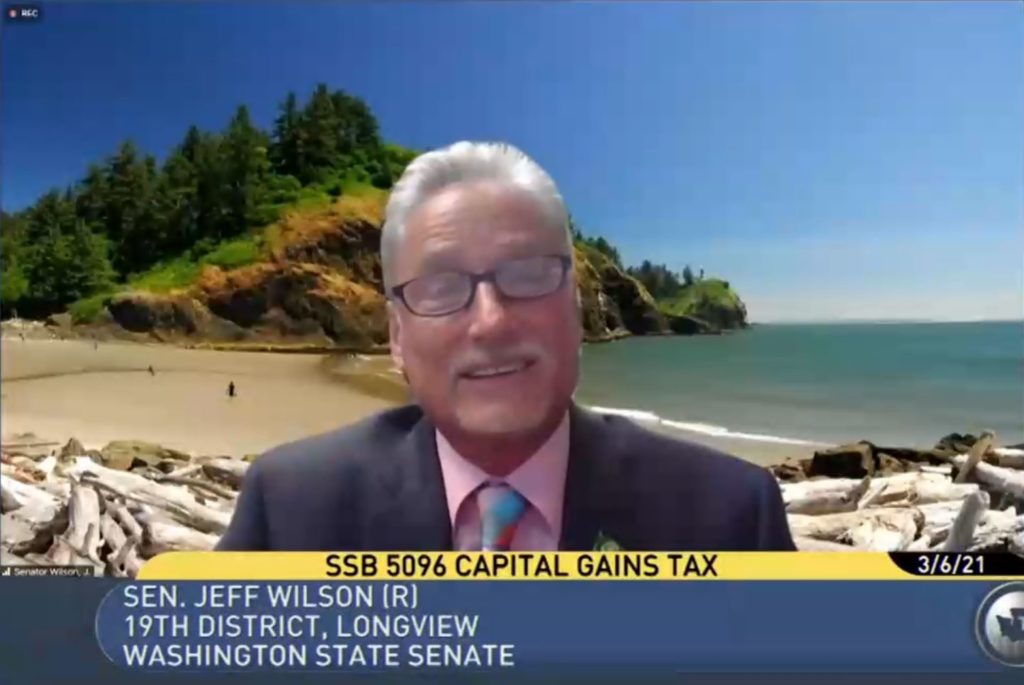Cites experience of other states, statements of prominent Democratic governors

To see video of floor speech, click here.
OLYMPIA – A starter income tax approved by Senate Democrats Saturday will lead to enormous financial problems, and a big, broad income tax on all the state’s taxpayers won’t be far behind, said Sen. Jeff Wilson, R-Longview.
To prove it, he cited the experience of other states that have imposed heavy taxes on high earners – which always find that tax collections run short during recessions. That’s because the wealthy avoid selling assets during down markets. States are forced to find additional money to plug the holes, and that leads them to expand taxes to the middle class.
“This bill before us today makes the same really big mistake,” he said. “We would be placing heavy taxes on the income of high earners. And we would be writing budgets that count on that money every year, even though high-earner taxes are very unstable and not dependable.”
Senate Bill 5096, advocated by the governor, passed the Senate 25-24 Saturday and moves to the House for further consideration. Passage of the bill would launch a court challenge which sponsors hope will lead the state Supreme Court to overturn its 1933 ruling that a graduated income tax is unconstitutional.
The measure launches an income tax on capital gains over $250,000, and because of exemptions will capture mainly profits on stock sales. But Wilson said it won’t remain a tax on the wealthy for long.
— In California, tax collections tanked after the Great Recession in 2008, and the state found itself with a $40 billion shortfall. Several years later, in 2014, then-Gov. Jerry Brown explained at a news conference that heavy taxes on capital gains were a primary reason California’s budget troubles were bigger than other states. Brown stood in front of a chart labeled “Unpredictable Capital Gains,” showing enormous ups and downs. Brown said:
“What goes up just as sharply comes down. It did it once, it did it again, and now – we’re not quite sure what it will do. But we know over time that zig-zag will follow us. The problem here is that if you make commitments, to employees’ salaries, to programs that are ongoing, then when revenue drops, you’re in a hole.”
— In Connecticut, the state faced a $5 billion shortfall in 2017. Former Gov. Daniel Malloy said:
“About one percent of the population pays 30 percent of the income tax revenue. That is going to make you subject to some pretty big swings. What I have argued for routinely is as broad a base for revenue sourcing as possible.”
— In New York, the state faced a $2.3 billion shortfall in 2019. Gov. Andrew Cuomo said:
“The top 1 percent pays about half of all the taxes. This is the flipside. Tax the rich. Tax the rich. Tax the rich. The rich leave. And now what do you do?”
High-earner taxes aren’t a solution, they’re the problem, Wilson said.
“I never thought I would quote these leading liberal Democratic governors as authorities on anything,” Wilson said. “I trust them on this.”
The comments show it’s a terrible idea to build budgets around high earner taxes, and that when tax collections run short, the middle class will be asked to pick up the slack, Wilson said.
He added, “You don’t have to take my word for it. You can take it from Jerry Brown and Gov. Andrew Cuomo.”








